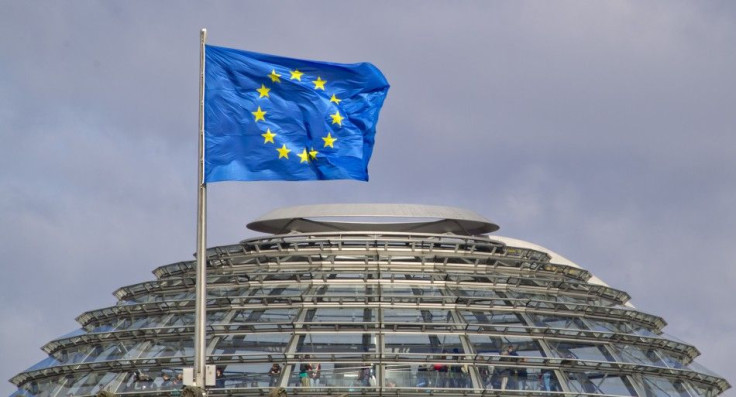Euro Zone Avoids 2nd Recession As German Q1 GDP Surprises

Stronger-than-expected growth in Germany helped the euro area avoid its second recession in three years at the start of 2012, figures released Tuesday show, but stagnation in France and contraction in southern Europe underlined the huge economic disparities across the single currency bloc.
Recessions are generally characterized by two straight quarters of falling gross domestic product. The region's economy shrank by 0.3 percent in the last three months of 2011, but by barely dodging another contraction in the first quarter, the euro zone avoided falling back into recession.
The euro zone's economy saw zero growth in the first quarter of the 2012, beating economists' forecast of a 0.2 percent contraction, the European Union's statistics office Eurostat said Tuesday.
However, the debt crisis has already dragged eight countries in the euro zone into a recession. France, the region's second-largest economy, narrowly avoided a contraction by recording no growth in the first three months of this year.
Greece saw its economy contract by an annual rate of 6.2 percent as its exit from the currency union loomed ever larger. Greek socialist leader Evangelos Venizelos said Greece is headed for a fresh general election after a final round of talks on Tuesday morning failed to produce agreement on a new government.
Italy's economy, the third-largest in the region, shrank more than expected, falling 0.8 percent and marking the third consecutive quarter of contraction.
Spain's economy was the latest to slip into recession, contracting by 0.3 percent and for the second straight quarter. Portugal's economy remained in recession declining 0.1 percent, and Cyprus lost ground as well. The Netherlands saw its economic output shrink 0.2 percent.
The only good news that came out of the 17-nation euro zone was the better-than-expected growth in the region's largest economy, Germany. The German economy recorded a 0.5 percent growth in the first three months of this year, an improvement from the decline of 0.2 percent at the end of 2011 and five times more than economists' forecast.
Germany is holding up the rest of the euro zone, Nick Kounis, head of macroeconomic research at ABN Amro in Amsterdam, told Bloomberg. While it will remain the outperformer, I doubt this will happen again in the second quarter, he said, adding that for the euro area the second quarter is likely to be negative.
The European Commission's forecast on May 11 confirmed its prediction of a 0.3 percent contraction in 2012 in the euro region and a 1 percent growth in 2013. By contrast, it said Germany's economy will grow 0.7 percent in 2012 and 1.7 percent in 2013.
Reports that Greece is set for a new election grabbed the markets' attention and added to traders' uncertainty.
The region's benchmark Stoxx Europe 600 index fell 0.47 percent to 246.27, while Germany's benchmark DAX index lost 0.56 percent to trade at 6,415.69.
The euro fell sharply against the dollar to $1.279 from $1.282 late Monday. The euro hasn't closed under $1.28 since mid-January.
© Copyright IBTimes 2025. All rights reserved.






















